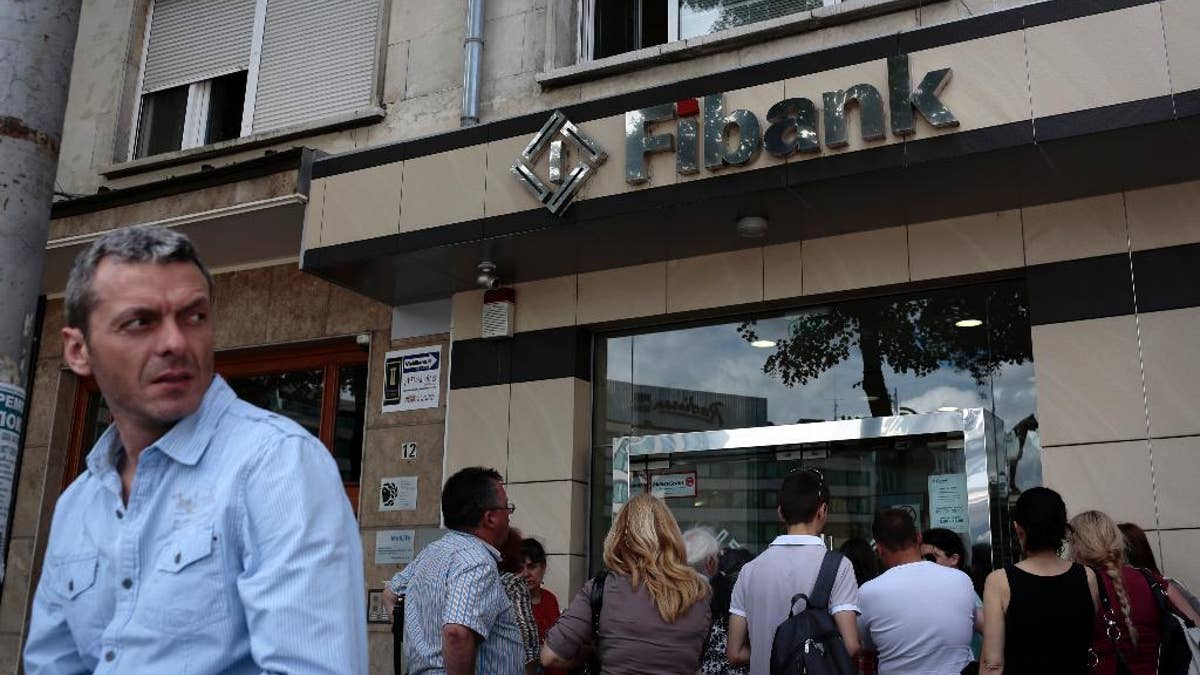
A man stands in front of the a branch of First Investment Bank as people still wait outside at the end of the working time, Sofia, Friday, June 27, 2014. A second Bulgarian bank has been hit by a run within the past week, prompting authorities to issue a statement claiming there is no reason for depositors to worry about their money despite reports the financial system is shaky. First Investment Bank, Bulgaria's third-largest lender, was the target of media rumors on Friday alleging that it was short on liquidity, causing public panic and a run on deposits. (AP Photo/Valentina Petrova) (The Associated Press)
SOFIA, Bulgaria – Bulgaria sought to stabilize its banks with rescue money on Monday after what the government called a criminal plot to undermine them with rumors triggered runs on deposits.
Police arrested five people on Sunday for allegedly using text messages, e-mails and phone calls "to spread false information that caused detriment to commercial banks and destabilized the banking system."
The rumors of liquidity shortfalls had caused widespread concern and two banks were hit by runs on deposits despite the authorities' insistence that there was no reason to worry. The government eventually decided to offer a 3.3 billion-leva ($2.25 billion) emergency credit line to the banks to stabilize them.
Shares in the banks soared Monday after the European Commission, the EU executive, cleared the move.
President Rosen Plevneliev, who convened party leaders at an emergency meeting on Sunday, said "there is no banking crisis but a crisis in confidence and criminal attacks."
"We have sufficient reserves, means and tools to deal with any attempt at destabilization, and we stand behind each bank that becomes the target of an attack," he said.
On Friday, First Investment Bank, the country's third-largest bank, was hit by a run, just days after the fourth-largest lender, Corpbank, had been put under special central bank supervision after itself suffering a run.
Some Bulgarians continued to withdraw money from First Investment Bank on Monday. But the queues were visibly smaller than on Friday, when the bank had to close early because of the rush to withdraw deposits.
On Monday, the Bulgarian central bank proposed changing the penal code to give prison sentences of five to ten years to those who willfully disseminate misleading information about banks. Currently, the act is only punishable with fines.
The EU Commission, the 28-nation bloc's executive whose approval of bank rescue programs is needed, said "the Bulgarian banking system is well capitalized."
Plevneliev said the country's currency will continue to remain pegged against the euro despite the volatility in the financial system.
In 1997, Bulgaria's currency, the lev, was pegged at a fixed rate to the euro under a currency board arrangement, which imposed strict financial rules aimed at restoring fiscal discipline, preventing deficit spending and controlling inflation.
Bulgaria, the European Union's poorest member country, has maintained financial stability since the 1996-1997 financial crisis that led to hyperinflation and the collapse most of the country's commercial banks.
